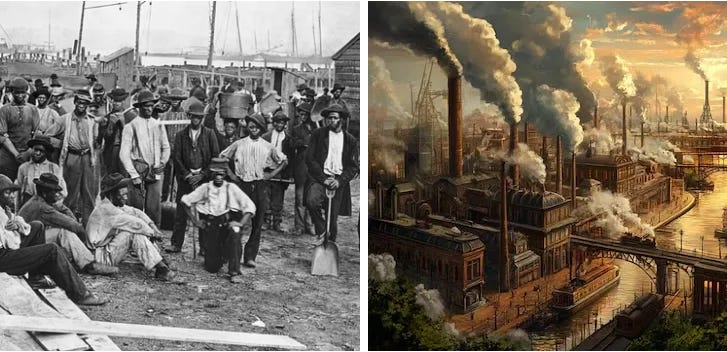Juneteenth: No, America's Wealth Wasn't Built By Slaves - Slavery Held Us Back
There's a reason the North wiped out the South: free men create, innovate and prosper, slavery freezes development in place. By 1861, the difference was stark.
Don’t miss my video “What Trump’s Critics Don’t Get About His Iran Strategy.”
This essay is free, but with Premium Membership you get MORE. Join today.
by Rod D. Martin
June 19, 2025
One hundred sixty years ago today, slaves in Texas received word for the first time that they’d been emancipated. They called that day Juneteenth. It is certainly worthy of celebration.
But the same Democrat Party that enslaved black Americans, who fought a war to keep them slaves, and failing that spent the next century terrorising and degrading them and their grandchildren, doesn’t celebrate this holiday so much as it uses it as a club, to stoke division among people who had nothing to do with any of that.
One means by which they do this is the lie that “the wealth of America was built on the backs of slaves.” The irony is, the Democrat South lost precisely because it was not, and that same Democrat South remained an impoverished backwater for the next century because Democrats never learned the lesson.
Free Soil, Free Labor, Free Men
This was precisely the issue on which the Republican Party was founded — and I’m pleased to note that not only did my party free the slaves and give them the vote, it also never had a member who owned a slave, and never had its own terror wing like the KKK, the Weather Underground, BLM or Antifa.
The party that within one election of its founding elected Lincoln was launched on a platform of “Free Soil, Free Labor, Free Men”. The details of the then-current political debate in 1856 and 1860 are worthy of discussion, but the idea is simple:
Slavery is inherently wrong
Free men create and innovate, while slaves (and their masters) do not
Over time the masters become a de facto feudal aristocracy and thereby a threat to the Republic and the Constitution.
Lincoln believed that slavery would eventually destroy the Republic. If you understand Frederick Jackson Turner’s “frontier thesis” you know why. You also know why leftists from Howard Zinn to David Hogg loathe Turner. But they hate Hayek for the same reason.
By the time Lincoln won the Presidency, the free North had pulled mightily ahead of the slave South by virtually every measure, but certainly in terms of factories, railroads, shipping, and everything needed to create a modern economy…or fight a continental war.
The result? By failing to avert war (by stupidly attacking Fort Sumter at a moment at which there was almost zero political support for Lincoln attacking the South), and then failing to knock out the North early (say, in the follow-up to a needed victory at Antietam), the South found itself in a war of attrition it could never win, simply by the weight of Northern economic might. And that might had come into being — almost ex nihilo — by the tireless labors and brilliant entrepreneurship of free men.
And then the North destroyed what little the South had.
Marxist historians claim that slave-based crops like cotton, and the finished goods that came from them, created American wealth. But economic historians Alan L. Olmstead and Paul W. Rhode note that “US cotton played no role in kick-starting the Industrial Revolution.” Worse still, although cotton exports comprised a large share of total exports prior to the Civil War, they accounted for only around 5 percent of the nation’s GDP.
So unless Standard Oil, and Edison Electric, and the Union Pacific, and Carneigie Steel were all built by slaves no one knew about, the wealth of America was built by free men. And a great many former slaves participated in the creation.
The case for envy is laughable. Slavery held the South back. It built manors little different from those of medieval lords and with roughly that rate of advancement. Meanwhile, the real action was to the north and west, where creative free peoples transformed the Earth.
More Slavery Means Less Prosperity, Even Over 100 Years Later
But it’s not just in America. Slavery is a disaster for all who employ it. In fact, Harvard economist Nathan Nunn has shown that throughout the New World, the more dependent on slavery a nation was in 1750, the poorer it was in 2000.

Of course, nowhere is poorer than Africa. And nowhere had — or has — more slavery. The overwhelming majority of this was and is indigenous. That’s quite apart from those slaves captured and sold — most often by other Africans — to the Americas.
Don’t miss this FREE 2nd excerpt from my new Essays on the Counterrevolution. You can also get the book itself for FREE when you become a Premium Member!
This relationship also exists in the U.S. In 2000, states with more slaves in 1860 were poorer than states with fewer slaves and much poorer than the free Northern states.

Note that that’s per capita income all the way into the 21st Century, not back in the 19th. Slavery casts a long shadow. What it doesn’t do is build wealth. Rather, it entrenches backwardness and poverty.
The end of serfdom unleashed widespread prosperity in Europe. The abolition of slavery in the North did the same. Unfortunately, that prosperity didn’t reach the South until Republicans beat the Democrats not just on the battlefield but at the ballot box. And that took a while.
But you needn’t look to the 19th Century when the 20th is available. Beyond Birmingham and Baton Rouge, Socialists made Russia, Eastern Europe, China and countless others giant slave camps, and with predictable results. By the end of the Cold War the Communist world was hopelessly behind its free Western peers by every measure except nuclear weapons.
Or to put that another way, Communists built the Berlin Wall to keep their people in. Donald Trump is having to build a wall to keep people out. The number of people around the world who would move to America given the chance is virtually limitless. Virtually none would move to China, much less Venezuela.
The Republicans Were Right
Lincoln and his followers didn’t just abolish slavery. They extended liberty, and in particular, entrepreneurship.
Even at the height of the Civil War, Lincoln doggedly advanced that vision. In 1862, he and a Republican Congress — who surely would have been outvoted had the Democrats not seceded — passed twin pillars of the next saeculum of American prosperity: the Homestead Act, and the Transcontinental Railroad Act (technically the Pacific Railroad Acts of 1862).
These gave life to the dream of Jeffersonian Democracy: a nation of freeholders, carved out of largely empty land only recently made settleable (other than by nomads) by then-new technology, accessed and held together by the North’s decisive advantage, rail.
Each of those family farmers would own and operate a small business. None would be giant plantation owners as in the South, or absentee landlords as in Latin America and Europe. Each would have a stake in the American system.
And it worked. As Turner shows, that vision populated the continent, fed growing industry, and helped make America globally dominant. Its bias toward individual liberty gave birth to the greatest industrial enterprises, technological innovations, and cultural assimilation in history. It made peoples from every corner of the Earth one, one in creed and one in interest.
It made an America torn by Civil War into that “shining city on a hill”, figuratively of course, providing an example of freedom that swept the world; but literally as well. At the outset of the war, only the very wealthy could afford indoor lighting (powered by expensive whale oil). Two decades later, every home had kerosene lamps, and electric lights were on their way. Little girls could learn their lessons after dark. Factories could run a second or even third shift. The arts could be made available to the masses.
There’s nothing like it in the whole history of humanity.
And yet not one jot nor tittle of it sprang from my benighted South.
There’s a reason.
Why Does All This Matter?
So why does all this matter today, 160 years after the first Juneteenth?
Well one reason is that this Democrat lie, that American wealth came from its slaves, is used to stoke race hatred as we speak. It’s an argument from envy — indeed, the entire Democrat Party operates as a systematic violation of the 10th Commandment — pretending that slavery built America when it actually enervated and destroyed the South, like a slow-working poison long imbibed. The belief that every white American today owes every black American some untold fortune is a powerful propellant for painful strife.
And the Democrats have always lived by a strategy of “divide and conquer”. Or as the dearly departed David Horowitz said: “The issue is never the issue. The issue is always the revolution.”
Second, the “slavery built America” lie ignores that socialism is just an extreme, if more subtle, form of slavery, at exactly the moment when Democrats openly call themselves Socialists and espouse programs that are straight out of Fidel Castro and Hugo Chavez.
But perhaps most important, this Big Lie obscures the real lessons of the Civil War: that the Republican program of “Free Soil, Free Labor, Free Men” not only freed the slaves, it unleashed an entire nation’s human potential. We live in the midst of the plenty that abolition created.
But that’s the point: abolition created that plenty, not the debilitating slavery that went before, or the demeaning segregation that came after, in the South.
So Juneteenth should not be a cause for protests, riots, or hate.
Juneteenth should be a celebration, of the defeat of the Southern Democrat slave empire, of the uplifting and uniting of all races, and of the glory that is our America.











>>"Slavery casts a long shadow. What it doesn’t do is build wealth. Rather, it entrenches backwardness and poverty."
One can argue that it is the same with the "Great Society" and its progeny of multi-generational illegitimate birth rates and welfare dependency - as experience has now shown, so negating those programs stated purpose(s), even if they were initiated with noble intentions.
Same too with the Left's / Democrats' "psy-op" to convince Blacks that their woes are due to "institutional racism," "built on the backs of slavery" and so on.
Good summary of what Juneteenth should stand for. Although I believe the celebration of Juneteenth should be temporary: until the time we truly achieve the goal of MLK, that all persons should be judged by their character and not by the color of their skin. Until our society is truly color blind. And if that requires the total destruction of the Democrat party, so be it.
My third great grandfather came to Texas in 1853, applied for citizenship in 1857 and achieved it in 1860. Besides being a farmer, he was a journalist who wrote articles celebrating the opportunities in Texas back to those he left behind in Czechia. At the same time he wrote articles against slavery and secession, to the anger and consternation of his planter neighbors who issued death threats. He survived, but one of his three sons was killed on a trip delivering cotton to be sold in Mexico during the Civil War.
Understandably, I am totally against reparations of any kind. Rewarding someone who hasn't been harmed in any way by punishing someone who didn't have anything to do with creating the harm is ridiculous on its face.